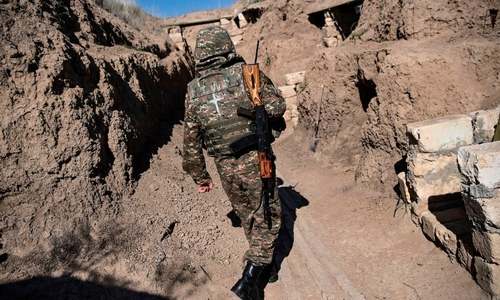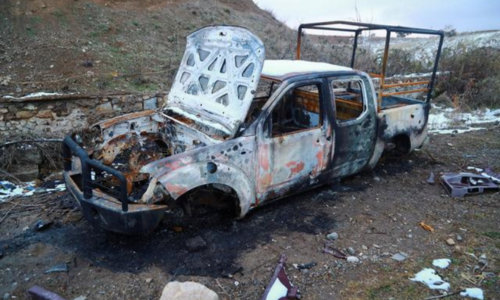YEREVAN: Six Armenian soldiers were captured by Azerbaijan on Thursday, the latest in a series of escalating border incidents after last year’s war over the disputed Nagorno-Karabakh region.
The capture of Armenia’s soldiers comes at a delicate time for Prime Minister Nikol Pashinyan ahead of snap elections next month.
Pashinyan described the situation as “tense and explosive” and called for international observers to be placed on the border between Armenia and Azerbaijan.
The Armenian defence ministry said that its forces were carrying out engineering work in a border region when Azerbaijan’s army “surrounded and captured six servicemen”.
However, Azerbaijan’s military described the Armenian soldiers as a “reconnaissance and sabotage group”.
It said the Armenian soldiers had “tried to mine supply routes leading to Azerbaijan army positions” and “were surrounded, neutralised and taken prisoner”.
“The situation is tense and explosive,” Pashinyan said during his visit to the eastern Gegharkunik region, where the soldiers had been captured.
Speaking separately at a meeting of his security council, the prime minister suggested that international observers be placed on the border between Armenia and Azerbaijan.
The incident on the border between the historic rivals was just the latest in several months and puts additional pressure on a ceasefire brokered by Russia last year.
Last year, the two ex-Soviet countries in the Caucasus region fought for six weeks for control of Nagorno-Karabakh, an ethnic Armenian region in Azerbaijan that had been controlled by separatists for decades.
Some 6,000 people were killed in the conflict which ended after Moscow brokered an agreement between Yerevan and Baku that saw Armenia hand to Azerbaijan large sections of territory it had controlled for decades.
The ceasefire, monitored by some 2,000 Russian peacekeepers, has largely held but tensions have persisted.
Among the recaptured territories was Kelbajar district, which lies across the border from Gegharkunik.
A senior Armenian army representative said there were some 1,000 Azerbaijani soldiers on Armenian soil near Gegharkunik.He said that for now incidents are resolved peacefully, but “if a decision is taken to use force, then they will be destroyed”. Azerbaijan said that Armenia deployed tanks to the area.
Armenia said one of its soldiers was killed earlier this week after shooting broke out with Azerbaijan’s forces, an incident Baku denied it was responsible for.
Armenia had earlier in the month accused Azerbaijan’s military of crossing its southern border to “lay siege” to a lake that is shared by the two countries.
The latest escalation comes ahead of snap parliamentary polls in Armenia on June 20.
Pashinyan announced the polls under pressure from opposition protesters, who for months staged rallies demanding the prime minister’s resignation.
They hold him accountable for what many in Armenia believe was a humiliating defeat at the hands of Azerbaijan’s army, and for agreeing to hand over swathes of territory to Azerbaijan.
Pashinyan, 45, says he had no choice but to concede or see his country’s forces suffer even bigger losses.
Published in Dawn, May 28th, 2021
















































